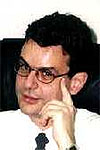As awareness of human rights increased, as their definition expanded and as new, often authoritarian polities, resorted to torture and repression - human rights advocates and non-governmental organizations proliferated. It has become a business in its own right: lawyers, consultants, psychologists, therapists, law enforcement agencies, scholars and pundits tirelessly peddle books, seminars, conferences, therapy sessions for victims, court appearances and other services.
Human rights activists target mainly countries and multinationals.
In June 2001, the International Labor Rights Fund filed a lawsuit on behalf of 11 villagers against the American oil behemoth, ExxonMobile, for "abetting" abuses in Aceh, Indonesia. They alleged that the company provided the army with equipment for digging mass graves and helped in the construction of interrogation and torture centers.
Among the accused: "IBM and ICL which provided the computers that enabled South Africa to ... control the black South African population. Car manufacturers provided the armored vehicles that were used to patrol the townships. Arms manufacturers violated the embargoes on sales to South Africa, as did the oil companies. The banks provided the funding that enabled South Africa to expand its police and security apparatus."
Charges were leveled against Unocal in Myanmar and dozens of other multinationals. In September 2002, Berger & Montague filed a class action complaint against Royal Dutch Petroleum and Shell Transport. The oil giants are charged with "purchasing ammunition and using ... helicopters and boats and providing logistical support for 'Operation Restore Order in Ogoniland'" which was designed, according to the law firm, to "terrorize the civilian population into ending peaceful protests against Shell's environmentally unsound oil exploration and extraction activities".
The defendants in all these court cases strongly deny any wrongdoing.
But this is merely one facet of the torture business.
Torture implements are produced - mostly in the West - and sold openly, frequently to nasty regimes in developing countries and even through the Internet. Hi-tech devices abound: sophisticated electroconvulsive stun guns, painful restraints, truth serums, chemicals such as pepper gas. Export licensing is universally minimal and non-intrusive and completely ignores the technical specifications of the goods (for instance, whether they could be lethal, or merely inflict pain).
Amnesty International and the UK-based Omega Foundation, found more than 150 manufacturers of stun guns in the USA alone. They face tough competition from Germany (30 companies), Taiwan (19), France (14), South Korea (13), China (12), South Africa (nine), Israel (eight), Mexico (six), Poland (four), Russia (four), Brazil (three), Spain (three) and the Czech Republic (two).
Many torture implements pass through "off-shore" supply networks in Austria, Canada, Indonesia, Kuwait, Lebanon, Lithuania, Macedonia, Albania, Russia, Israel, the Philippines, Romania and Turkey. This helps European Union based companies circumvent legal bans at home. The US government has traditionally turned a blind eye to the international trading of such gadgets.
American high-voltage electro-shock stun shields turned up in Turkey, stun guns in Indonesia, and electro-shock batons and shields, and dart-firing taser guns in torture-prone Saudi Arabia. American firms are the dominant manufacturers of stun belts. Explains Dennis Kaufman, President of Stun Tech Inc, a US manufacturer of this innovation: ''Electricity speaks every language known to man. No translation necessary. Everybody is afraid of electricity, and rightfully so.'' (Quoted by Amnesty International).
The Omega Foundation and Amnesty claim that 49 US companies are also major suppliers of mechanical restraints, including leg-irons and thumbcuffs. But they are not alone. Other suppliers are found in Germany (8), France (5), China (3), Taiwan (3), South Africa (2), Spain (2), the UK (2) and South Korea (1).
Not surprisingly, the Commerce Department doesn't keep tab on this category of exports.
Nor is the money sloshing around negligible. Records kept under the export control commodity number A985 show that Saudi Arabia alone spent in the United States more than $1 million a year between 1997-2000 merely on stun guns. Venezuela's bill for shock batons and such reached $3.7 million in the same period. Other clients included Hong Kong, Taiwan, Mexico and - surprisingly - Bulgaria. Egypt's notoriously brutal services - already well-equipped - spent a mere $40,000.
(Note: You can view every article as one long page if you sign up as an Advocate Member, or higher).




